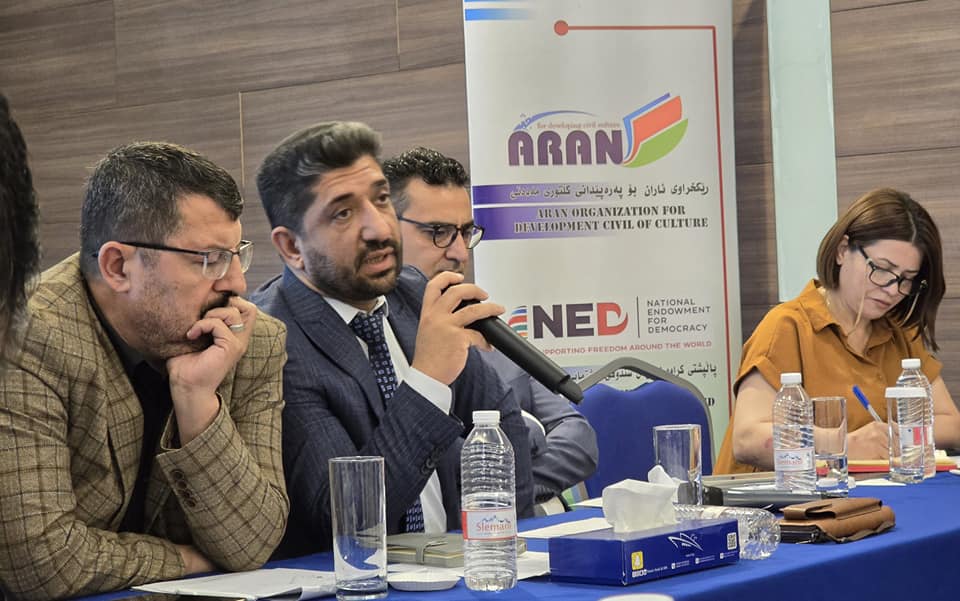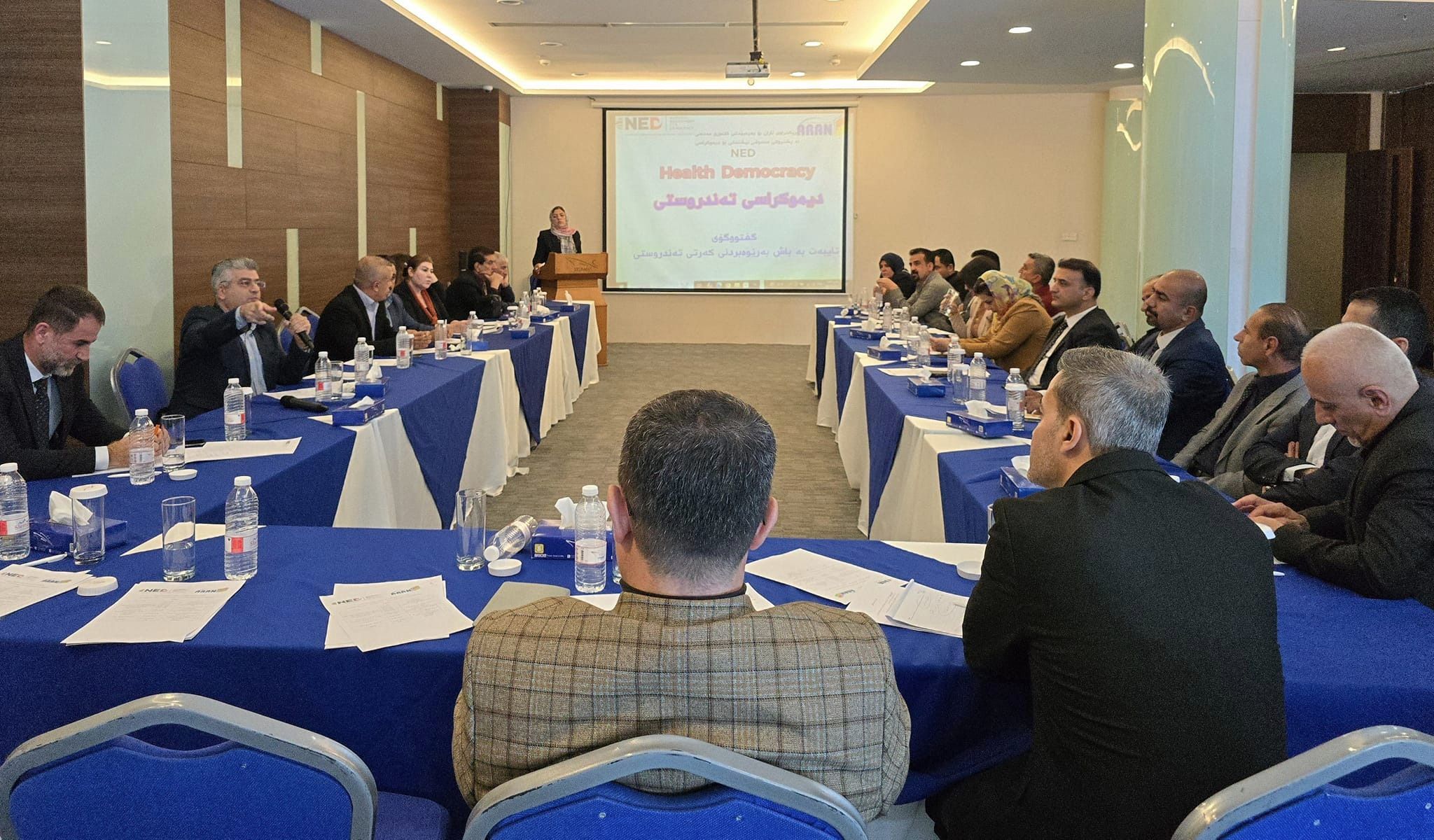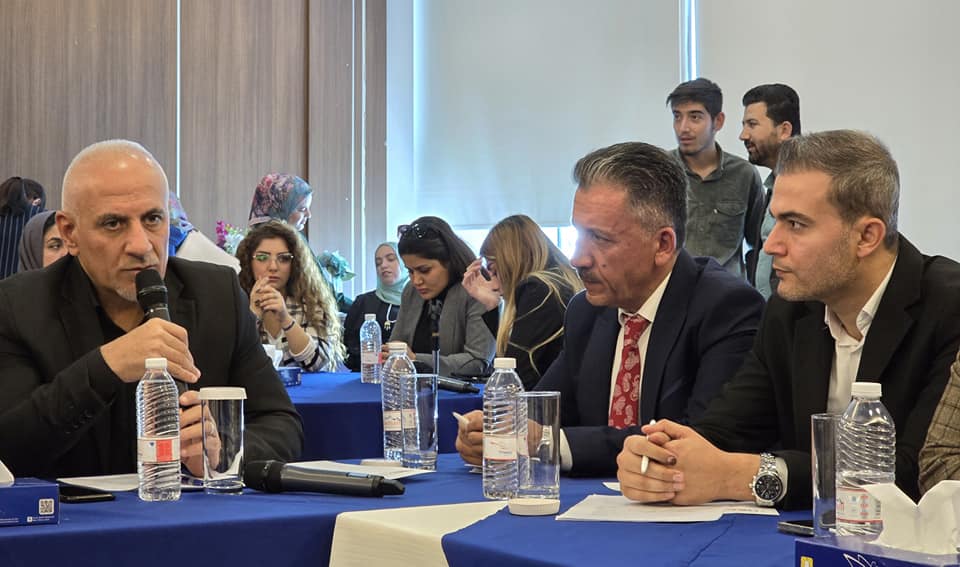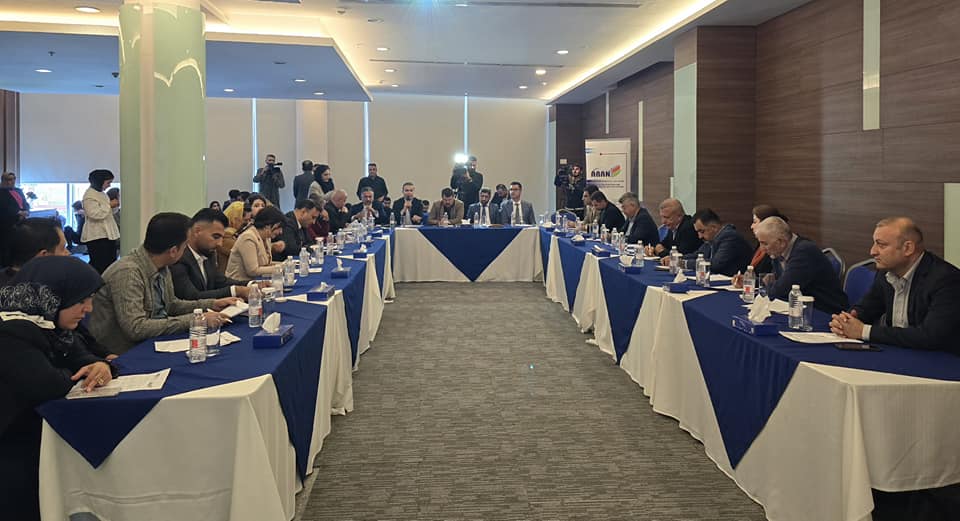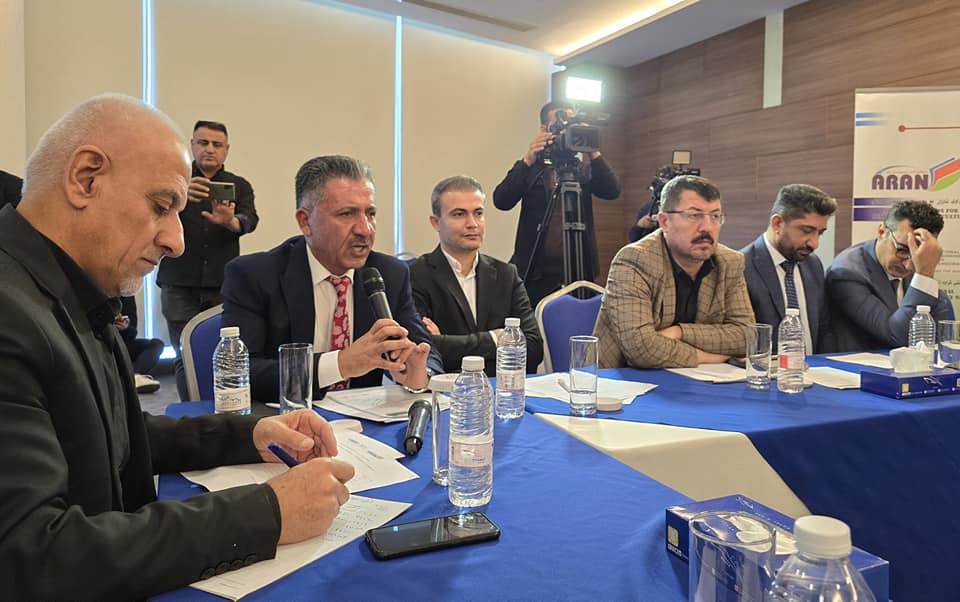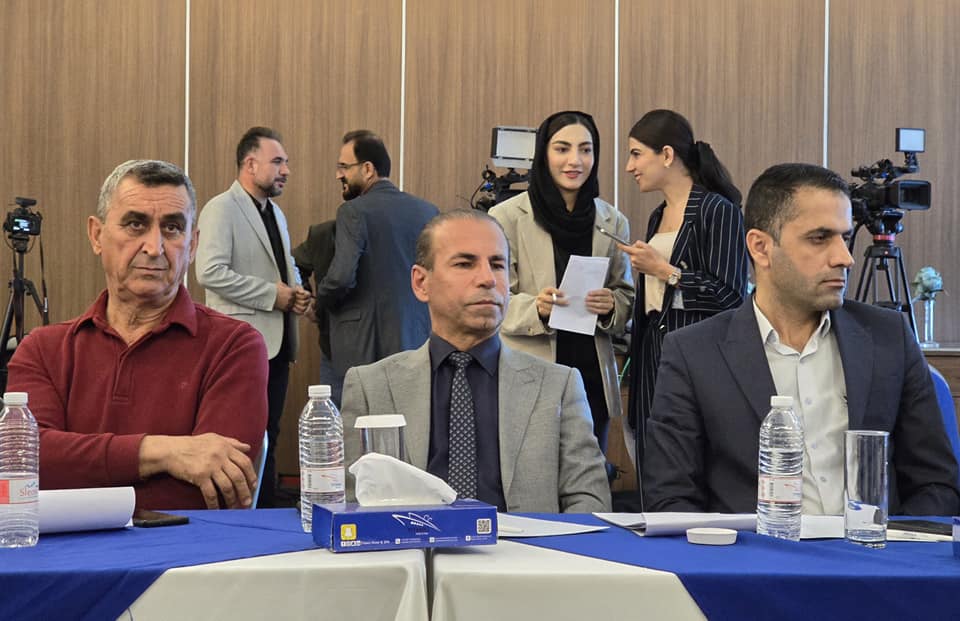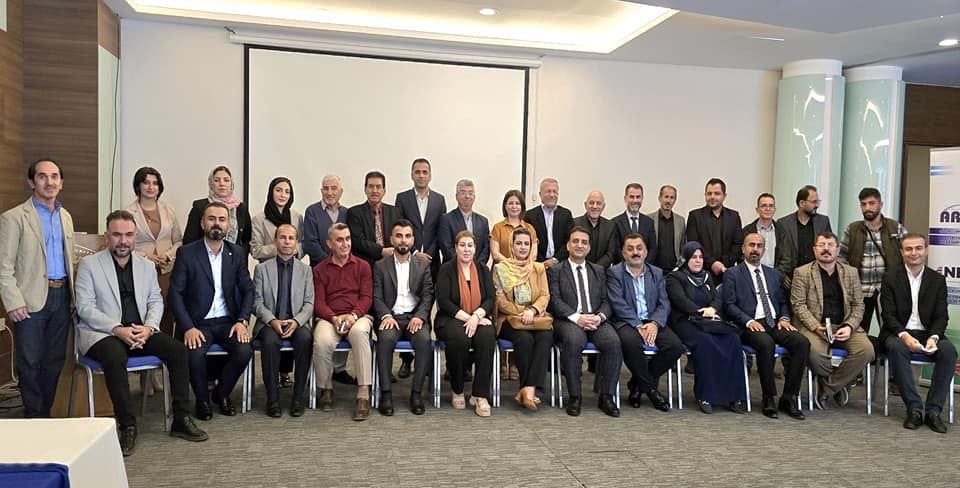Health Democracy Dialogue in Sulaymaniyah
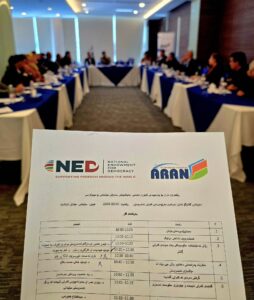
A dialogue session was held with the presence of 34 stakeholders and 28 journalists representing 20 media outlets. The session was organized by Aran Organization with support from the National Fund. It took place on 30-10-2024 in the Titanic Hotel Hall in Sulaymaniyah.
Stakeholders:-
Relevant Officials:-
– Dr. Hayman Asi, General Director of Shorsh Teaching Hospital.
– Dr. Soran Omar Hama, Head of Private Sector Monitoring and Inspection at the Directorate of Health, Sulaymaniyah.
– Mr. Omed Hedayat, Director of Administration at Shar Teaching Hospital (Nominee and winner in the Kurdistan Regional Elections).
– Mr. Saber Abdullah, Director of the Human Rights Directorate in Sulaymaniyah (Representing the local Sulaymaniyah administration).
Other Key Speakers:-
– Dr. Abdul Fattah Mohammed Rahim, Head of Health Protection Studies at Sulaymaniyah University and Professor at the College of Medicine, University of Sulaymaniyah.
– Dr. Yad Hameed, Pharmacist and prominent health activist.
Victims of Mismanagement in the Health Sector (Witnesses):
Health and Other Activists:-
– Number: 25
Discussion Topics:-
According to Aran Organization’s prior plan, the phenomenon of patients being forced to opt for the private sector instead of public healthcare was discussed. At the start of the session, Aran Organization provided information on the topic based on its investigative report, followed by detailed explanations from the representatives of Sulaymaniyah Health regarding the issues highlighted in the organization’s presentation.
Speakers’ Perspectives:-
Dr. Abdul Fattah Mohammed Rahim:-
– Emphasized the importance of the dialogue session in improving the health sector, identifying its challenges, and finding solutions.
– Made several observations regarding the management of the health sector in Kurdistan Region, affirming that the session was a suitable platform to express these observations.
– Highlighted the seriousness of the issue of patients being forced to go to the private sector.
– Praised Aran Organization’s role as the only organization addressing this important topic, reaffirming his support for the organization in tackling this issue.
Dr. Yad Hameed:-
– Appreciated the efforts made by Aran Organization and acknowledged the seriousness of the issue raised.
– Pointed out that the compulsory redirection of patients to the private sector is a problem that needs to be addressed.
– Recommended the need to separate the interests of health sector officials from those of the private sector by enforcing the law.
Witness Testimonies from Victims:-
Three citizens attending the session testified about being compelled, through various means, to turn to the private sector by some doctors and health officials with vested interests.
Participant Engagement:-
All attendees shared their views during the session, creating a lively and serious discussion on the topic at hand.
Strengths:-
- Comprehensive and Well-Organized Event:-
A comprehensive dialogue session was organized, bringing together a wide range of stakeholders, demonstrating the organization’s ability to coordinate and manage significant events effectively.
- Diverse Participants:-
The session included representatives from various sectors such as health, human rights, media, as well as witnesses and activists, enriching the discussion with multiple perspectives.
- Serious Discussion on Core Issues:-
The session addressed sensitive and significant topics like compelling patients to resort to the private sector, reflecting Aran Organization’s commitment to addressing critical social issues.
- Extensive Media Coverage:-
Despite coinciding with major events, the session attracted substantial media presence, indicating the topic’s relevance to both the media and the public, enhancing the session’s impact.
- Credible and Realistic Testimonies:-
Incorporating testimonies from victims of health sector mismanagement added credibility to the discussion, making the session more relatable to citizens’ daily struggles.
- Support from Specialized Speakers:-
Participation of experienced professionals like Dr. Abdul Fattah and Dr. Yad added an academic and critical dimension to the session, contributing to analyzing the issues raised and underlining the session’s role in proposing practical solutions.
- Interactive Participation:-
The attendees were engaged and shared their opinions, indicating the organization’s success in fostering an environment that encourages serious and open dialogue.
- Social Impact Through Online Sharing:-
Participants’ social media posts about their insights from the session reflect the session’s impact and help increase public awareness of the discussed issues.
Success Indicators:-
- Large and Diverse Attendance:
The presence of 34 stakeholders and 28 journalists from 20 media outlets reflects the session’s appeal and success in attracting relevant parties interested in the topic.
- Extensive Media Coverage:-
Attendance by 20 media outlets shows the media’s interest in the subject, indicating the session’s success in reaching a broader audience.
- Expert Participation and Meaningful Contributions:-
Contributions from specialists like Dr. Abdul Fattah and Dr. Yad as key speakers who provided detailed insights into issues and proposed solutions offer academic and professional support to the session, enhancing its credibility.
- Active Participation and Engagement:-
The contributions and active engagement of all participants suggest the session’s success in encouraging open and effective dialogue.
- Testimonies from Victims of the Issue:-
Victims’ presence and testimonies added credibility and realism, making the public more connected to the topic, and helping shed light on actual suffering.
- Social Media Attention:-
Many participants posted their opinions and assessments of the event on social media, reflecting the session’s impact on attendees and helping spread awareness among the public.
- Participants’ Commitment to Pursuing Solutions:-
Dr. Abdul Fattah’s willingness to work with the organization until final solutions are found indicates professional support, increasing the likelihood of making a real impact on the health sector.
- Media Attention Despite Major Concurrent Events:-
Despite coinciding with significant events like the announcement of election results and the annual “Al-Miri Meeting” in Erbil, the session caught the media’s attention, underscoring its importance.
- Concrete Recommendations:-
The speakers’ specific recommendations, such as separating public and private interests, highlight the session’s contribution to proposing actionable, practical solutions.
Session Outcomes:-
- Raising Awareness of Patients’ Rights:-
Educating the community, especially patients and health sector workers, about their rights and available legal actions to combat cases of forced redirection to the private sector.
- Initiating Health Policy Reforms:-
Developing recommendations to amend health policies, including revising regulations to impose restrictions on illegal redirection cases and enhancing legal protection of patients’ rights.
- Establishing a Coordinating Committee of All Stakeholders:-
Forming a committee including representatives from the local government, health directorate, and health unions to unify efforts and address the issue comprehensively.
- Enhancing Parliamentary Oversight of the Health Sector:-
Activating the role of Parliament members to monitor and evaluate the health sector performance in public and private institutions, with periodic reports to ensure compliance with reform policies.
- Improving the Quality of Public Health Services:-
Implementing plans to improve the efficiency of public health services to ease the burden on the private sector and reduce cases of forced redirection, thus providing high-quality services to patients.
- Encouraging Active Participation of Patients and Activists in Health Policy-Making:-
Encouraging patients and activists to engage in dialogue sessions and decision-making, enhancing transparency and accountability, and making policies more responsive to community needs.
Recommendations:-
- Activating a Complaint and Legal Follow-Up Mechanism:-
Establishing an official mechanism to receive patient complaints regarding cases of forced redirection and facilitate legal actions for affected individuals.
- Introducing Legal Amendments to Limit Forced Patient Redirection:-
Proposing amendments to local legislation to curb forced redirection cases, with penalties for institutions that violate these laws (to be included in the draft Ministry of Health bill expected to be discussed in the Kurdistan Parliament in the coming months).
- Strengthening Oversight and Follow-Up by the Health Directorate:-
Reinforcing the Health Directorate’s role in monitoring the implementation of new recommendations and ensuring health institutions comply with legal procedures.
- Launching Public Awareness Programs on Patients’ Rights:-
Implementing awareness campaigns to educate the public about the importance of claiming their rights and following legal avenues in cases of forced redirection.
- Publishing an Annual Report on Public and Private Health Service Quality:-
Issuing an annual report on the performance of health institutions, providing a clear vision for improving services and enhancing transparency.
- Encouraging Collaboration with Civil Society:-
Working with civil society organizations to organize workshops and dialogue sessions that spotlight this issue and help raise individuals’ awareness of their roles and responsibilities to ensure adherence to health and ethical standards.
Media Coverage:-
Despite coinciding with significant events such as the announcement of election results in the Kurdistan Region and the annual “Al-Miri Meeting” in Erbil attended by Bafel Talabani, President of the Patriotic Union of Kurdistan, Nechirvan Barzani, President of the Kurdistan Region, and Ali Al-Alaq, Governor of the Central Bank of Iraq, the session garnered significant media attention.
